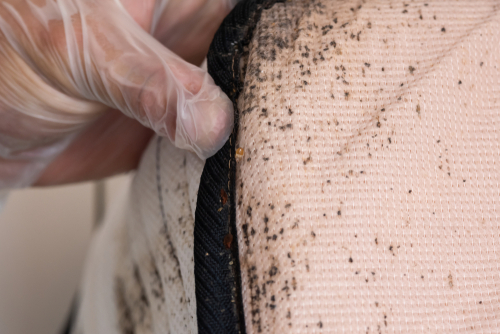


The Psychological Impact of Bed Bug Infestations
The Psychological Impact of Bed Bug Infestations. The global rise in bed bug infestations has presented physical challenges and profound psychological impacts in recent years.
This comprehensive guide delves into the mental health implications of dealing with bed bugs and offers strategies for coping, recovery, and resilience.
Table of Contents
The discovery of bed bugs often triggers immediate stress and anxiety.
The ongoing battle against these pests can lead to chronic stress, as constant worry, irritability, and heightened alertness.
The unpredictability and invasiveness of bed bugs contribute significantly to this distress.
One of the most immediate impacts of bed bug infestations is sleep disruption. The anxiety of being bitten can lead to insomnia and other sleep disorders.
Long-term sleep deprivation can exacerbate stress, affect cognitive functions, and impact overall physical health.

There is a significant social stigma associated with bed bugs, often leading to feelings of shame and embarrassment. This can result in social isolation and a reluctance to seek help or disclose the problem to others.
Bed bug infestations can strain relationships, causing tension and conflict within households.
In shared living environments, stress can lead to blame and mistrust among roommates or family members.
It is crucial to recognize the signs of psychological distress, which can include persistent anxiety, mood swings, and feelings of helplessness.
These symptoms can impact daily functioning and overall quality of life.
In some cases, prolonged or severe infestations can lead to symptoms similar to Post-Traumatic Stress Disorder (PTSD).
Recognizing these symptoms early and seeking appropriate treatment is vital.

Adopting practical coping strategies, such as staying organized, seeking accurate information about bed bugs, and maintaining regular routines, can help manage stress and anxiety.
Mindfulness and relaxation techniques, including deep breathing exercises, meditation, and yoga, can effectively reduce anxiety and improve sleep quality amidst the stress of an infestation.
Understanding when to seek professional help is critical. Signs that may indicate the need for professional intervention include persistent distress, disruption to daily activities, and severe sleep issues.
Various resources include counselors, therapists, and online support groups.
These resources can provide emotional support and practical advice for dealing with the psychological impact of bed bugs.
Implementing preventive measures, such as regular inspections and maintaining cleanliness, can help alleviate anxiety related to potential infestations.
Being informed and prepared can significantly reduce the psychological burden.
A contingency plan can provide a sense of control and reduce panic if bed bugs are discovered.
This includes steps for immediate action and strategies for maintaining mental well-being during eradication efforts.

Recovery from the psychological impact of a bed bug infestation involves both mental and emotional healing.
Strategies include participating in therapy, engaging in stress-relief activities, and gradually rebuilding confidence in the safety of one’s living environment.
The power of sharing personal experiences and coping strategies cannot be overstated.
Engaging in community forums or support groups can provide comfort, reduce feelings of isolation, and offer valuable insights.
Correcting myths and misconceptions about bed bugs is essential for reducing undue stress and anxiety.
This includes understanding that bed bugs do not result from poor hygiene and do not discriminate based on socioeconomic status.

Beyond the psychological and physical toll, bed bug infestations can have significant economic consequences.
One of the most immediate financial burdens of bed bug infestations is the cost of extermination.
Hiring professional pest control services can be expensive, especially for severe infestations that require multiple treatments.
Additionally, the need to replace infested furniture and belongings can further strain finances.
In some cases, bed bug infestations can lead to legal disputes, particularly in shared living spaces such as apartments and hotels.
Tenants may take legal action against landlords, claiming negligence in addressing the infestation.
Understanding the legal implications and potential liabilities is essential for both landlords and tenants.
Bed bugs can infest and damage personal belongings, including clothing, furniture, and electronics.
Replacing these items can be costly, and in some cases, sentimental items may be irreplaceable.
The financial burden of replacing infested possessions can add to the overall economic impact.
Businesses in the hospitality industry, such as hotels and rental properties, can suffer financial setbacks due to bed bug infestations.
Negative reviews and reputational damage can lead to decreased bookings and revenue loss.
Implementing effective bed bug prevention measures is a matter of customer satisfaction and a financial imperative.
Some governments have implemented regulations and guidelines for addressing bed bug infestations. These measures may include requirements for landlords to address infestations promptly and transparently. Understanding local regulations and advocating for stronger enforcement can help protect tenants’ rights.
Communities can play a significant role in addressing bed bug infestations.
Local health departments, community centers, and neighborhood associations can organize awareness campaigns and provide resources to affected individuals.
Encouraging open conversations about bed bugs reduces stigma and promotes early reporting and intervention.

As bed bugs adapt and evolve, ongoing research is essential to develop more effective management strategies. This section explores the latest advancements in bed bug management and prevention.
Scientists and pest control experts continually research innovative pest control methods to combat bed bugs.
This includes the development of environmentally friendly insecticides, heat treatment technologies, and improved detection tools.
Educating pest control professionals and the public about bed bug biology, behavior, and management is crucial.
Ongoing training programs ensure professionals have the latest knowledge and techniques to address infestations effectively.
Integrated Pest Management (IPM) approaches, which combine various strategies like monitoring, prevention, and targeted treatments, are gaining popularity in bed bug management.
IPM focuses on long-term solutions and reduced reliance on chemical treatments.

In conclusion, the psychological impact of bed bug infestations is a critical aspect that deserves attention and support.
Understanding the emotional toll, seeking help when needed, and sharing experiences can contribute to better mental health outcomes for individuals and communities affected by bed bugs.
It’s time to recognize the multidimensional nature of this issue and take collective action to address it comprehensively.
Are you seeking professional and reliable pest control or bed bug control services in Singapore? Contact us today!